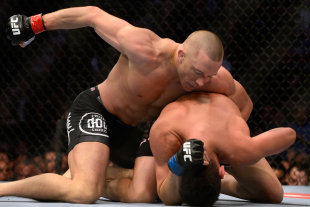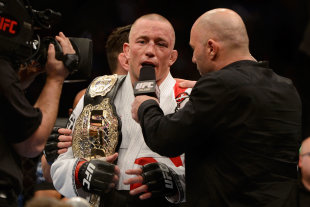It's hard not to feel sorry for Georges St-Pierre.
By his own admission, the UFC welterweight champion "has everything" and enjoys "a great life," as a result of his athletic skills. He's an idol to millions, rich beyond his wildest dreams and is set financially for the rest of his life.
Yet for years, St-Pierre has been dogged by a whisper campaign that he's using performance-enhancing drugs. One-time rival B.J. Penn made the allegations public, but he only said aloud what others in the sport were saying privately.
[Related: After demolishing JDS, who can challenge Cain Velasquez?]
That greatly pained St-Pierre, who has always maintained his chiseled physique is the result of hours of work in the gym and a lifestyle dedicated to health and fitness, not PEDs.
When it was announced in the summer that St-Pierre would defend his welterweight title on Nov. 16 in the main event of UFC 167 in Las Vegas against top challenger Johny Hendricks, St-Pierre said he would submit to drug testing done by the Voluntary Anti-Doping Association (VADA). In addition, St-Pierre offered to pay for Hendricks to enroll in the program and do the testing as well.
Hendricks agreed, but the deal fell through without a contract being signed, so St-Pierre is going through the VADA program on his own. Brent Brookhouse of Bloody Elbow covered the collapse of the testing agreement in exhaustive detail last month.
The Cliffs Notes version is that the Hendricks camp became suspicious of St-Pierre's relationship with VADA and was wary because of questions raised by St-Pierre's attorney when discussion turned to having the Nevada Athletic Commission regulate testing through an accredited lab in Salt Lake City.
The testing should have been able to be put together simply enough but for some reason, it was not. There are several people who could easily be deemed to blame for the failure of the St-Pierre and Hendricks camps to reach agreement, but the one thing that should not have come out of its failure is criticism of St-Pierre's intentions.
He went to great pains, and expense, to arrange for the testing and when an agreement with Hendricks couldn't be reached, he opted to have himself tested in the most rigorous manner possible in an effort to prove he is a clean athlete.
One of the problems many professional athletes, particularly fighters, face today is that there is a "guilty until proven innocent" mentality surrounding sports. So many athletes have been caught cheating that the public and media now suspects everyone is using.
St-Pierre is well aware of it. The odd way the agreement with Hendricks fizzled has put him in the crosshairs, and he's been judged guilty in the court of public opinion without a trial.
There is a PED problem in mixed martial arts, as there is in boxing, and there is not nearly the concerted testing effort needed to catch those who illegally seek an advantage.
But the constant finger-pointing has wearied St-Pierre, who has come to accept it as part of doing business.
"Always, I get criticized, no matter what I do," St-Pierre said. "It's part of the game and I'm ready for that, no problem."
The solution, of course, is for all of the athletes to be tested as part of an ongoing program. Random, unannounced testing won't prevent all cheating, but it will prevent most and is far better than the postfight screens done by state athletic commissions now.
Cheaters are able to easily beat those screens, largely because they know when they're coming and they can time their illicit usage accordingly. Additionally, most state testing is inadequate due to lack of funding.
And then, even if a fighter is caught via a postfight screen, it didn't prevent him or her from competing in the first place. The reason for the testing should be to prevent PED users from ever being able to fight and put their opponents at greater risk than usual.
When someone like St-Pierre comes forward and wants to set a standard, it's a good thing that lasts until the lawyers get involved and it turns into a fiasco.
It's mind-blowing to St-Pierre that his effort to prove himself clean and perhaps push the UFC in the right direction has led to him becoming the villain.
"I wanted to do something for the sport," St-Pierre said. "Unfortunately, it didn't go the way I wanted it to, but I have no choice in it. We're going to fight and it is what it is. I'm doing it because I said I would do it and I'm a man of my word."
It's unfortunate that someone trying to do the right thing is facing criticism; it should be the cheaters who are excoriated, not those who are willing to take a stand against it.
It's led to speculation that St-Pierre is going to retire, but though he's been scarred by the incident and is clearly perturbed, he's got no plans to walk away after the Hendricks fight.
He calls Hendricks "the most dangerous guy I've ever fought," and said he's still in love with the competition, even if the critics are a hassle.
Despite everything, he still looks forward to getting up and going to work every day.
"I'm planning my next fight [against Hendricks], and I'm not thinking of retiring," St-Pierre said.
"I'm going to keep [fighting] until I don't enjoy it any more. When I get to that point, I'll say, 'This is it. I'm tired and I'm not enjoying it anymore.' It could be tomorrow and it could be 10 years. Who knows? I will listen to myself and listen to my body, and now it's good. I'm excited for this next fight."


